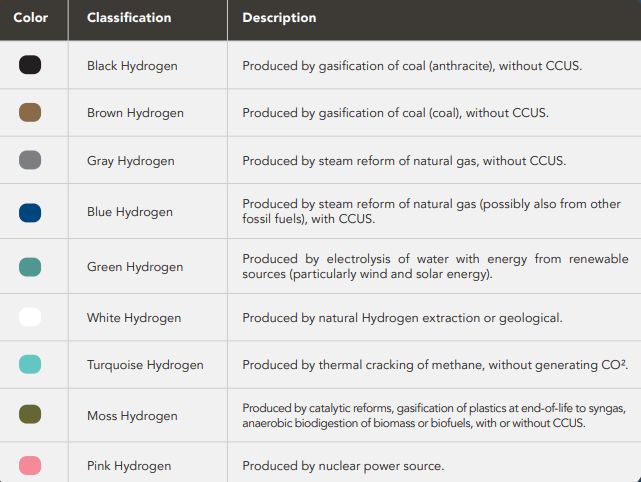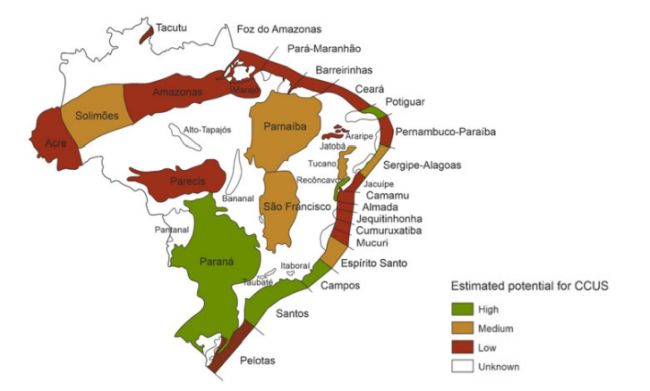- within Energy and Natural Resources topic(s)
- in Middle East
- in Middle East
Overview
Hydrogen gas (“Hydrogen”), a non-metal natural resource equivalent to oxygen, nitrogen, and carbon on the periodic table, is a versatile energy carrier and feedstock, derived primarily by splitting water molecules or reacting fossil fuels with steam or controlled amounts of oxygen. Hydrogen has served chiefly as an input into a range of industrial processes and, if produced using low or zero-emissions sources, can enable deep decarbonization across the energy and industrial sectors.
The principal classifications of Hydrogen are based on the sources of its production, directly reflecting the carbon footprint resulting from the production process. Thus, Hydrogen is classified in several ways, commonly translated into colors:

In this edition, the focus will be on Blue Hydrogen, produced from fossil fuels and with carbon capture steps (Carbon Capture Usage and Storage – CCUS) in its industrial process, complying with the energy transition principles.
Carbon Capture Usage and Storage
Although the international concern for renewable energy (such as low-carbon Hydrogen), global Hydrogen production is still mainly based on industrial processes without Carbon Capture Usage and Storage – CCUS:

In the context of energy transition, Carbon Capture Usage and Storage – CCUS has the potential to reduce the release of CO², representing, for example the difference between the production process between Gray Hydrogen (without CCUS) and Blue Hydrogen (with CCUS).
Carbon storage aims to permanently lock CO² released from Hydrogen production into deep geological formations, ensuring that it does not return to the atmosphere. Salt caves, depleted oil and gas fields, and deep saline aquifers can be used for this purpose.
In addition, captured CO² has several functionalities, such as Enhanced Oil Recovery, which consists of injecting CO² into active mature fields to raise the pressure, resulting in increased oil recovery.
Legal Framework
The Brazilian Federal Constitution establishes that the Brazilian Federal Government owns: (i) the natural resources of the continental shelf and the exclusive economic zone, and (ii) mineral resources, including those of the subsoil1 , which will guide the regime for exploration and production of Hydrogen.
Thus, if Hydrogen (White Hydrogen) is found outside of the continental shelf or of the exclusive economic zone, even in underground reservoirs, it will not be the Federal Government's asset. Nevertheless, within the aforementioned limits, it will be owned by the Federal Government, and there must be a grant for its exploration (an issue not yet clarified by Brazilian legislation).
Thus, there is no regulation yet on Hydrogen in Brazil. Moreover, the fact that Hydrogen can be obtained from several sources raises some issues regarding the legal framework. This is because different regulatory bodies may be involved in its regulation, as the National Agency for Petroleum, Natural Gas and Biofuels (“ANP”), and the National Electric Power Agency (“ANEEL”). In this sense, the regulation of Hydrogen should be institutionally aligned in order to avoid conflicts and ensure regulatory certainty.
With regards to Blue Hydrogen, it is derived from fossil fuels and is considered a by-product of the oil and gas industry. Thus, according to Law No. 9.478/97 (“Petroleum Law”), its regulation would seem to fall under the ANP's authority, although Hydrogen is not particularly listed as such.
Regarding the Carbon Capture Usage and Storage - CCUS, no regulation requires specific authorization. We believe that a subsidiary application of the environmental rule in the scope of licensing natural gas exploration and production can be an alternative in CCUS implementation.
The Scenario for Brazilian Blue Hydrogen
The Brazilian Hydrogen economy is prompted by both the guidelines to the National Hydrogen Program (“PNH2”) and the national policy of enhancing energetic transition and reducing carbon emissions, as established by Law No. 12,187/2009 (“Climate Change National Policy Law”) and targets designed by the Paris Agreement.
Besides the several attractive factors surrounding Brazil's capabilities in Hydrogen production, the country is further elaborating its own PNH2 to be conceived through a dialogue between the Federal Government, the States, and the market.
Therefore, considering the global tendency to work on the development of the Hydrogen economy, the Brazilian National Energy Policy Council (“CNPE”) have already determined the drafting of the PNH2 and the allocation of electricity and oil and gas Research, Development and Innovation (“RD&I”) resources provided for in current regulations to Hydrogen development projects.
On June 23, CNPE approved a resolution about PNH2 and its governance in order to develop the Hydrogen economy, focusing on its use as an energy vector, and create a management committee for establishing strategic guidelines to be carried out by thematic chambers, but it still under approval process by the President of the Republic. PNH2 includes 6 strategic axes: (i) reinforcement of the scientific and technological bases; (ii) human resources training, (iii) energy planning; (iv) legal and regulatory framework; (v) market opening and increasing competitiveness; and (vi) international cooperation.
Despite there being no existing regulation for Brazilian Blue Hydrogen, there are some attractive factors for Blue Hydrogen production and exportation:
Project finance for Hydrogen
Brazilian Development Bank - BNDES has a specific credit line to support the implementation, expansion, modernization, construction, integration, and assembly of facilities and/or services for petroleum refining, and biorefinery, for the production of synthetic fuels, Hydrogen and bioproducts, and for fuel storage.
New Gas Market
Law No. 14,134/2021, known as the New Gas Law, opened the natural gas market to private players by attracting fresh investors to develop its business in the country.
Increase of the natural gas grid
It is also expected that Brazil's gas grid will be increased and integrated throughout the application of the resources enabled by the New Gas Law. Some projects are already under construction and licensing.
High prospect for carbon storage
Brazil is one of the biggest countries in territorial extension and has a vast area covered with sedimentary basins, onshore and offshore, and also located near emitting sources. Several studies have been providing for the possibility of storage on different sites. One of them is the pre-salt caves, one of Brazil's most prominent areas for oil extraction.
Brazil CO2 Storage Prospect

Next Perspectives
Bill of Law No. 725/2022, also known as the Hydrogen Bill of Law, aims to amend the Petroleum Law in order to consider Hydrogen as an energy vector for a transition to a low-carbon economy. It establishes the ANP´s competence for regulating, authorizing, and monitoring Hydrogen chain activities in Brazil. The Hydrogen Bill of Law also stipulates minimum standards for the Hydrogen volume incorporation in gas pipelines: (i) 5%, as of January 1, 2032, and (ii) 10%, as of January 1, 2050.
Other upcoming discussions on regulation may involve the applicability of RenovaBio (public policy of decarbonization set by Decree No. 9,888/2019), as well as the States and Federal Government taxes incentives for Blue Hydrogen.
Finally, it should be highlighted that Blue Hydrogen figures as an important energy resource in the context of the global movement for decarbonization. Although there is no regulation in Brazil yet, the energy industry is looking forward to Blue Hydrogen production and is already mapping out its opportunities. Finally, it should be a must that any upcoming legislation is compatible with the speed and open-innovation environment that the Hydrogen chain needs in order to increase its market share in the energetic matrix.
Footnote
1 Article 20, V e IX, Brazilian Federal Constitution
Visit us at Tauil & Chequer
Founded in 2001, Tauil & Chequer Advogados is a full service law firm with approximately 90 lawyers and offices in Rio de Janeiro, São Paulo and Vitória. T&C represents local and international businesses on their domestic and cross-border activities and offers clients the full range of legal services including: corporate and M&A; debt and equity capital markets; banking and finance; employment and benefits; environmental; intellectual property; litigation and dispute resolution; restructuring, bankruptcy and insolvency; tax; and real estate. The firm has a particularly strong and longstanding presence in the energy, oil and gas and infrastructure industries as well as with pension and investment funds. In December 2009, T&C entered into an agreement to operate in association with Mayer Brown LLP and become "Tauil & Chequer Advogados in association with Mayer Brown LLP."
© Copyright 2020. Tauil & Chequer Advogados, a Brazilian law partnership with which Mayer Brown is associated. All rights reserved.
This article provides information and comments on legal issues and developments of interest. The foregoing is not a comprehensive treatment of the subject matter covered and is not intended to provide legal advice. Readers should seek specific legal advice before taking any action with respect to the matters discussed herein.
[View Source]



